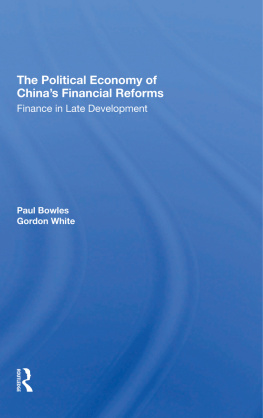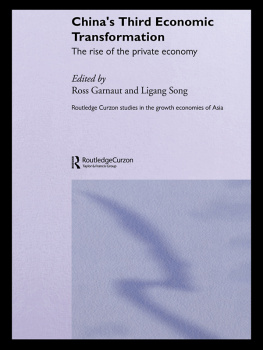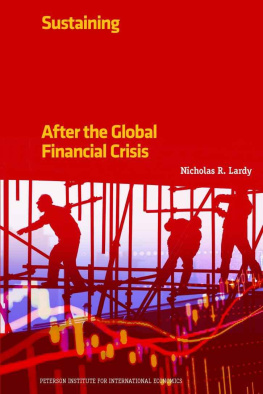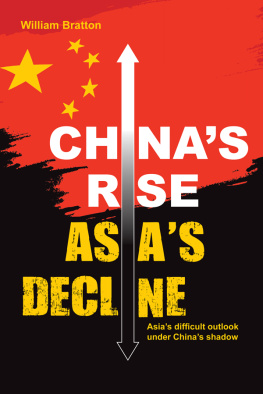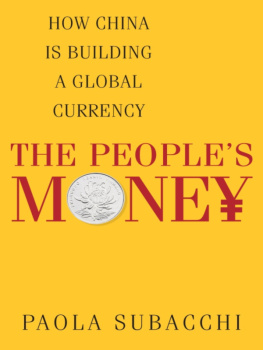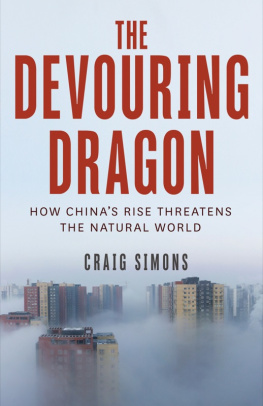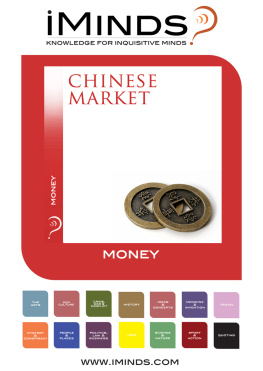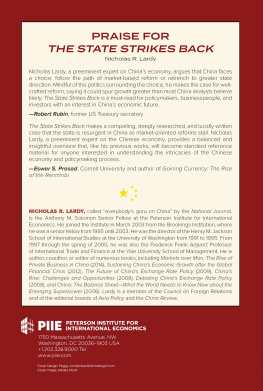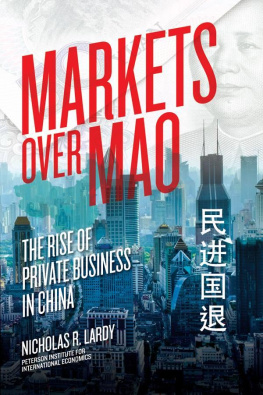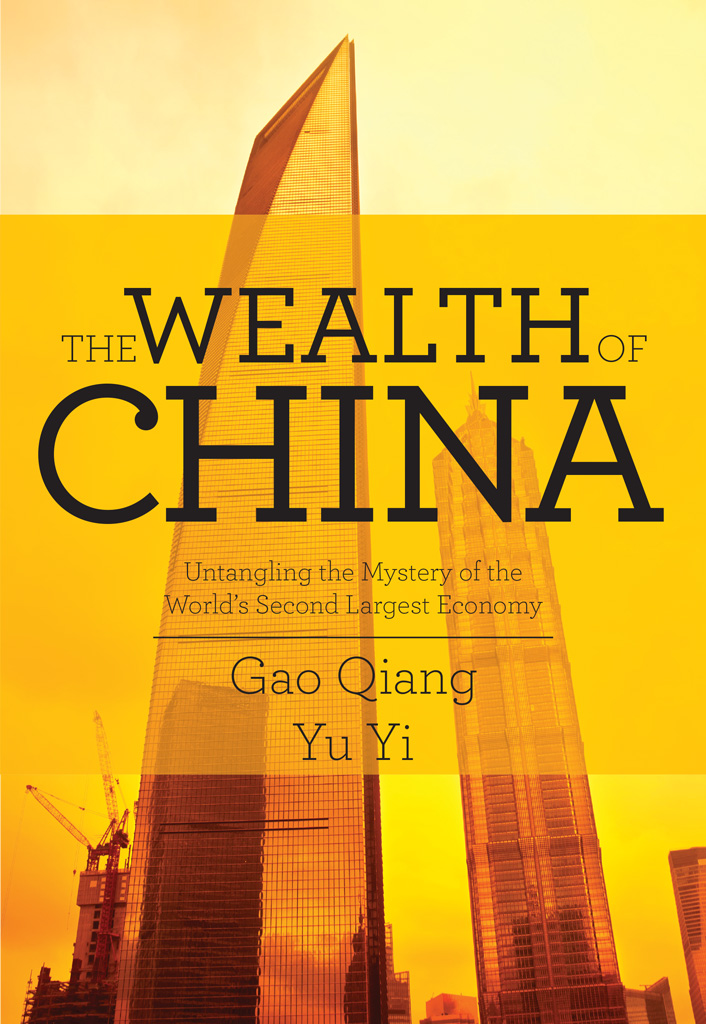THE WEALTH OF
CHINA
Untangling the Mystery of the Worlds Second-Largest Economy
Gao Qiang
Yu Yi

Copyright 2014 by CN Times Books, Inc.
All rights reserved. No part of this publication may be reproduced, distributed, or transmitted in any form or by any means, including photocopying, recording, or other electronic or mechanical methods, without the prior written permission of the publisher, except in the case of brief quotations embodied in critical reviews and certain other noncommercial uses permitted by copyright law. For permission requests, write to the publisher, addressed Attention: Permissions Coordinator, at the address below.
BEIJING MEDIATIME BOOKS CO., LTD.
CN Times Books, Inc.
501 Fifth Avenue
New York, NY 10017
cntimesbooks.com
ORDERING INFORMATION
Quantity sales: Special discounts are available on quantity purchases by corporations, associations, and others. For details, contact the publisher at the address above. Orders by U.S. trade bookstores and wholesalers: Please contact Ingram Publisher Services: Tel: (866) 400-5351; Fax: (800) 838-1149; or .
Originally published as : (The mystery of China: the truth behind the explosion of wealth). Nanjing: Jiangsu Literature and Art Publishing House, 2012.
COVER DESIGN: Andrew Hahn / Verso6.com
TRANSLATORS: Mabel Low, Katie Xiao, Julian Lee
COPY EDITOR: Andrea Koprowicz
PROOFREADER: Michael Eric Stein
ISBN-13: 978-1-62774-005-0 (print)
ISBN-13: 978-1-62774-032-6 (e-book)
PREFACE
The Chinese Model of the Mystery of China
THE THICK AND HEAVY ink of the golden age is splashed about, the colors running together to paint a diverse world with a mix of joys and sorrows.
Many of the scenes currently playing out leave people dazzled, yet sad at being coerced by smoke and mirrors. It is dj vu all over again, and we are trapped, trancelike, in the wheel of fate. A variety of time fragments both familiar and strange are mixed together and rearranged, as if in a theatrical show that has not been previously rehearsed.
On stage, the romantic dream-in-the-garden scene of The Peony Pavilion is being played. The audience is mesmerized, enveloped by fog, and sometimes it is difficult for them to discern the truth. There are all manner of mysteriesfrom those made by conjuring, to the accumulation of obscuring layers, to the truths being gently wiped away by the hand of timeand there are always new tricks. The old questions have not been answered, yet the story has come to an abrupt end, and new questions have been raised. With a certain kind of phenomenon, a certain story, a certain outcome, there has not been enough time for last nights drizzle to wash away the protagonists footprints, no matter how fainteven if the protagonist of the story was just the familiar Tom, Dick, or Harry from next door. In such close proximity or from a distance of only a few dozen yards away, yet separated by what seems like a thousand years in timeit cannot be severed and is entangled.
A China that once was known for extreme poverty and weakness has compressed more than two hundred years of the Western economic miracle into just over thirty years. Why is the rapid growth of a large country framed as ruining prospects for success by hurrying along the process rather than bucking convention? And amid the funeral bells tolling for the collapse of great powers, why is China thriving? There has been an enormous surge of currency, yet inflation remains moderate. Has a benevolent god really bestowed the industrious and brave Chinese people with a miraculous reservoir to absorb and issue currency day and night? Traditional economists sell a package consisting of economic and stock trends. Chinas stock market is a caper-cutting clown: it goes up and down like a seesaw and will temporarily soar depending entirely on its mood. It has completely failed to get onto a good economic track. There has been a clean break from the countrys impoverished past. But then, when one looks at the account ledger for ones own life, sadness emerges over a faltering pace that makes the pursuit of national wealth difficult. Real estate has been labeled market oriented in a manner resembling a wild horse prancing out a farcical scene on the national stage about how difficult peoples livelihoods are. Macroeconomic controls have increased, but they have only further fueled the rise of property. The more controls are placed on housing prices, the higher they go has become a profoundly meaningful curse.
There are many mysteries, both good and bad. Some of the mystery is prosperity, and some of it is untold desolation that is difficult to speak of. This is the mark that more than thirty years of reforms has left on every single person in the country.
In Wanqing qishinian (Seventy years in the late Qing dynasty), United Statesbased historian Tang Degang once predicted that 2040 would be the year for Chinas tumultuous and great transformation:
Regardless of how long it will take, there will come a day in history when the Three Gorges will finally be built. This is a historical inevitability. When that day arrives, Qinchuan will clearly have Hanyang trees, and there will be a lush growth of grass on Parrot Island. Amid our cheering, we will be able to sail straight down along the mighty eastward-flowing river, and we will enter a boundless sky over the Pacific Ocean.
This nation is immersed in thousands of years of culture, but it also has a good digestion and appetite, and has continually absorbed foreign culture. It constantly accepts new challenges as it steps up to one historical turning point after another. Whether standing in the shallow end of the water feeling stones to cross the river or wading into the deep water and crossing the river while carrying stones, has there never been a tale told of completing the historical Three Gorges and accomplishing everything else once and for all? If one makes the slightest mistake, the evanescent happiness will last only a few moments.
Today, we are deep inside the riddle, and it is difficult to glimpse the truth of the China model. To find a way out of the maze, capture what is obscured behind appearances, and, at the end of our winding path, distinguish the true silhouette from the haze, we must step carefully, as if on thin ice, and trek through the vast secrets of complex affairs.
In the context of reality, there are no purely economic issues. Once all the issues that have been dressed up as economic ones reveal their true nature, none of them can be relieved by economic laws. Western economists who examine China are mystified, and the crux of the problem is probably in this: they try to conceive of China in a purely sterile environment, severed from politics and culture, and thus their pondering does not bear any fruit. China has become the counterexample of economics.
How eager people are to appeal to the market, hoping it can enter China and occupy the streets and back lanes, provide armor for peoples brains and teeth, and bring about a rebirth that shakes China even more. However, it is very easy for mere idealism to be strangled in a China overgrown with brambles. After the initial rush forward that is based on wishful thinking, idealism runs itself to death in the complex games and negotiations of reality.
Sometimes, and especially when an economic issue ascends to the height of politics, the market cannot be left to solve problems on its own. It needs the support of political and administrative decrees. However, it is hoped that the broad trend toward marketization will leave the market with unfinished business and more flexibility in the use of political and administrative solutions to tackle difficult problems, so that more space can be freed up for economic laws to take effect.


